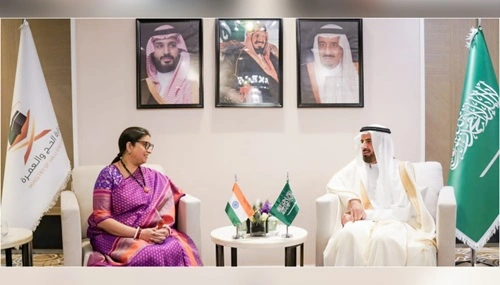In a significant step to facilitate seamless pilgrimage for Indian Muslims, India and Saudi Arabia signed a bilateral Haj agreement, finalizing the quota for Indian pilgrims for 2025. The agreement, signed during a high-level meeting between officials from both countries, underscores the strong bilateral ties and mutual commitment to supporting the spiritual aspirations of millions of Muslims.
The finalized quota will allow 175,025 Indian pilgrims to undertake the Haj pilgrimage in 2025, maintaining India’s position as one of the largest contributors of pilgrims to Mecca.
The Agreement and Its Significance

The agreement was signed by Union Minister for Minority Affairs, Smriti Irani, and Saudi Arabia’s Minister for Haj and Umrah, Dr. Tawfiq Al-Rabiah, during a formal meeting in Riyadh. The deal outlines key operational details for the Haj pilgrimage, including transportation, accommodation, healthcare, and logistical arrangements, ensuring a smooth experience for Indian pilgrims.
Smriti Irani emphasized the importance of the agreement in fostering cultural and spiritual connections between India and Saudi Arabia. “This agreement reflects our commitment to ensuring that every pilgrim has a safe, comfortable, and spiritually enriching journey,” she said.
Key Features of the Agreement
- Pilgrim Quota: The agreement reaffirms the quota of 175,025 Indian pilgrims, a number that accommodates individual and group travelers, including those under government and private tour operators.
- Logistical Planning: The Saudi government has assured enhanced facilities for pilgrims, including modernized transportation, better accommodations in Mecca and Medina, and improved services at airports and pilgrimage sites.
- Digital Platforms: Building on recent innovations, both sides agreed to integrate digital systems to streamline the application, payment, and tracking processes for Haj pilgrims, reducing administrative hurdles.
- Special Provisions: Additional focus will be placed on ensuring accessibility for elderly pilgrims and those with disabilities, offering better medical care and mobility assistance.
India-Saudi Cooperation on Haj
India and Saudi Arabia share a longstanding history of cooperation on Haj arrangements, with the annual pilgrimage serving as a key cultural and diplomatic bridge. Saudi Arabia, as the custodian of Islam’s holiest sites, has consistently worked with India to accommodate the growing number of pilgrims from the country.
Over the years, the introduction of initiatives like online application systems and digital payments has transformed the pilgrimage process, making it more transparent and efficient. The 2025 agreement builds on these advancements, reflecting the evolving nature of India-Saudi relations.
Pilgrim Sentiment and Reactions
The announcement of the 2025 quota has been met with widespread appreciation from the Muslim community in India. Many see it as a testament to the government’s commitment to facilitating one of the most significant spiritual journeys in Islam.
Aftab Khan, a resident of Lucknow, expressed his gratitude, saying, “The agreement ensures that Indian pilgrims can continue to fulfill their lifelong dream of performing Haj with dignity and ease. The collaboration between the two nations is truly commendable.”
Organizations involved in Haj operations, such as the Haj Committee of India, welcomed the agreement and reiterated their focus on improving the pilgrim experience.
Challenges and Preparations
While the agreement is a positive development, challenges remain in ensuring its effective implementation. Key areas of focus include:
- Cost Management: Rising costs for flights, accommodations, and other services have been a concern for many pilgrims. Both governments are working to subsidize and regulate costs to make Haj accessible to all.
- Health and Safety: Given the scale of the pilgrimage, health and safety measures are paramount. Enhanced medical services, vaccination drives, and disaster management protocols will be prioritized.
- Logistical Hurdles: Managing the transportation and accommodation of such a large number of pilgrims requires meticulous planning. Coordination between Indian and Saudi authorities is essential to prevent delays and inconveniences.
A Testament to Strong Bilateral Ties
The signing of the Haj agreement reflects the deepening ties between India and Saudi Arabia, not just in the religious and cultural domain but also in trade, investment, and strategic partnerships. The agreement comes at a time when both nations are actively exploring ways to enhance their relationship through economic cooperation and people-to-people connections.
Conclusion
The Haj agreement for 2025 is a crucial milestone in facilitating a seamless pilgrimage experience for Indian Muslims. It highlights the shared commitment of India and Saudi Arabia to strengthening their ties while ensuring that faith and tradition are upheld with the utmost respect.
As preparations begin for the 2025 pilgrimage, the agreement stands as a beacon of collaboration, ensuring that Indian pilgrims can embark on this sacred journey with peace of mind and spiritual fulfillment.

